Search results for "herbert lomas/www.booksfromfinland.fi/2004/09/no-need-to-go-anywhere"
Teemu Kupiainen & Stefan Bremer
Music on the go
3 March 2010 | Extracts, Non-fiction
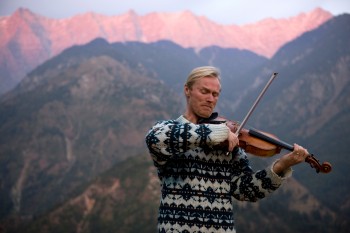
A little night music: Teemu Kupiainen playing in Baddi, India, as the sun sets. Photo: Stefan Bremer (2009)
It was viola player Teemu Kupiainen‘s desire to play Bach on the streets that took him to Dharamsala, Paris, Chengdu, Tetouan and Lourdes. Bach makes him feel he is in the right place at the right time – and playing Bach can be appreciated equally by educated westerners, goatherds, monkeys and street children, he claims. In these extracts from his book Viulun-soittaja kadulla (‘Fiddler on the route’, Teos, 2010; photographs by Stefan Bremer) he describes his trip to northern India in 2004.
In 2002 I was awarded a state artist’s grant lasting two years. My plan was to perform Bach’s music on the streets in a variety of different cultural settings. My grant awoke amusement in musical circles around the world: ‘So, you really do have the Ministry of Silly Walks in Finland?’ a lot of people asked me, in reference to Monty Python. More…
In the detail?
11 December 2009 | Essays, Non-fiction
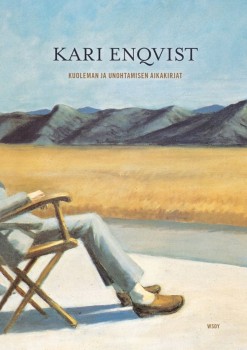 Extracts from Kuoleman ja unohtamisen aikakirjat (‘Chronicles of death and oblivion’, WSOY, 2009)
Extracts from Kuoleman ja unohtamisen aikakirjat (‘Chronicles of death and oblivion’, WSOY, 2009)
What’s the meaning of life? There are those who seek it in religion, while for others that is the last place to look. The scientist Kari Enqvist ponders why some people, including himself, seem physiologically immune to the lure of faith. Perhaps, he suggests, we should look for significance not in the big picture, but in the marvel of the fleeting moment
As a young boy I must have held religious beliefs. However, I cannot pinpoint exactly when they disappeared. At some point I eventually stopped saying my evening prayers, but I am unable to remember why or when this happened. ‘I was born in a time when the majority of young people had lost faith in God, for the same reason their elders had had it – without knowing why,’ writes the Portuguese poet Fernando Pessoa in The Book of Disquiet. More…
Why translate?
28 January 2015 | Essays, Non-fiction
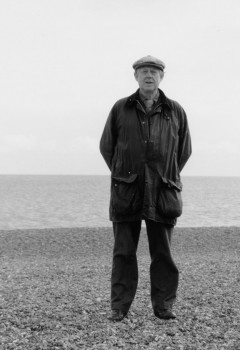
Down by the sea: Herbert Lomas in Aldeburgh. – Photo: Soila Lehtonen
‘People do not read translations to encourage minor literatures but to rediscover themselves in new imaginative adventures‚’ says the poet and translator Herbert Lomas in this essay on translation (first published in Books from Finland 1/1982). ‘Translation is a thankless activity,’ he concludes – and yet ‘you have the pleasure of writing without the agony of primary invention. It’s like reading, only more so. It’s like writing, only less so.’ And how do Finnish and English differ from each other, actually?
Any writer’s likely to feel – unless he’s a star, a celebrity, a very popular and different beast – that the writer is a necessary evil in the publisher’s world, but not very necessary. How much more, then, the translator from a ‘small’ country’s language.
Why do it? The pay’s absurd, you need the time for your own writing, it’s very hard to please people, and translation is, after all, the complacent argument goes, impossible. I’m convinced by all these arguments, and really I can’t afford to go on; but I don’t regret what I’ve done and, looking back, I can find two reasons for translating Finnish writing, one personal, the other cultural. More…
The engineer’s story
30 June 1981 | Archives online, Fiction, Prose
A short story from Maailman kivisin paikka (‘The stoniest place in the world’, 1980). Introduction by Pekka Tarkka
Coffee was going to be served down by the river. The engineer took my elbow and led me across his paved courtyard and over his lawn; we settled ourselves down in cane chairs under the trees. Mirja came out of the house with a tray of coffee and coffee-cups, a loaf of sweet bread, already cut, some marble cake and some biscuits. The engineer said nothing. My eye wandered over the ample weeping birches by the river, the mist creeping up in the cool of the evening and shifting in the cross-pull of the breeze and the current, and I watched Mirja moving under the trees back to the house and then down again to the riverbank.
As we sipped our coffee we spoke about chance, and the part it plays in life, about my husband – for I was able to speak about him now: enough time had gone by. The engineer eased himself into a comfortable position, gave me a quick look and then launched off into an account of his own, about his trip abroad:
I spotted the news item as I was going through the morning paper on the plane. I sat more or less speechless all of the first leg, listening to Kirsti and her husband confabulating. I didn’t say anything during the stop-over in Copenhagen, either, where they wanted to get some schnapps and, of course, some chocolate ‘if Kirsti would really like some’. We came rushing back into the plane just as the last English, German and Danish announcements were coming over, and then we sat waiting for the take-off. That was delayed too because of a check-up (not announced), and then we were off again for Zurich, me without a word and they whispering together. Then it was the bus as far as the terminal, and after that a taxi to the hotel. Quite clearly Kirsti hadn’t heard a thing about it yet, and probably hadn’t had much contact with Erkki for quite some time, her new husband even less. More…
In your own time
16 March 2010 | This 'n' that
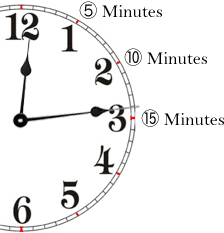 Ever wished there were just a few more hours in the day? We certainly have. Forgive us if you’ve seen it before, but this little homily has been doing the rounds on the internet in Finland. It made us laugh, if a little hollowly.
Ever wished there were just a few more hours in the day? We certainly have. Forgive us if you’ve seen it before, but this little homily has been doing the rounds on the internet in Finland. It made us laugh, if a little hollowly.
It’s healthy to eat an apple a day, and a banana, for the calcium, and an orange, for the vitamin C, and you need to drink a cup of green tea to reduce your cholesterol. You should also drink two litres of water (and wee the same amount, which doubles the amount of time you spend in the bathroom). And don’t forget the two decilitres of yogurt that you should eat to keep the bacterial flora of your stomach healthy. No one really knows what these bacteria are, but you MUST have at least a million of them, or you won’t be well! You must also drink a glass of red wine a day so you don’t have a heart attack, and a glass of white wine to protect your nervous system! And a glass of beer (I can’t quite remember why), but if you drink them all at the same time you may have a stroke. That won’t matter, though, as you won’t notice it. Everyone should also eat nuts and beans/peas every day. You should eat 4-6 times a day, light meals, but don’t forget that each mouthful should be chewed at least 36 times. That will take up 5 hours of your day! More…
Weird calm
31 March 1998 | Archives online, Fiction, poetry
A selection of poems, translated by Herbert Lomas and Anselm Hollo. Interview by Tarja Roinila
Agnosis IV
Set your altar up in the evening,
in the morning clear it away:
the wandering goes on. Don't persuade yourself
of anything, or anyone else:
fearful forces are epidemic,
no place is sacred
for long.
Again and again
the sacred
starts.
If you happen to be
there don't refuse to see.
(1989)
a light wind
stirring a treetop:
a shoal of fish
in blue abyss
From Hiidentyven (‘Weird calm’, Otava, 1984) More…
If grief smoked
31 March 1989 | Archives online, Fiction, poetry
Poems from six collections of poetry. Introduction by Herbert Lomas
The City
How the houses have ascended in this city,
the abysses deepened, the water blackened,
soon to be creeping along the streets.
The railings are rusting through,
the water table’s rising,
the cellars are slopping.
Fear is rising, or being covered up
behind strangling discretion,
outbreaks of crime.
The height of the night
15 October 2009 | Letter from the Editors
 The autumnal equinox is past; and as we tilt towards the winter solstice, here in these northerly latitudes, the darkness expands palpably from day to day, giving more space for introspection – high on the list of Finnish national pastimes – and for reading.
The autumnal equinox is past; and as we tilt towards the winter solstice, here in these northerly latitudes, the darkness expands palpably from day to day, giving more space for introspection – high on the list of Finnish national pastimes – and for reading.
We want to make our website primarily a place for reading – not, in other words, for clicking, going on to the next thing. To think to the end what cannot be thought to the end elsewhere, as the Russian poet Osip Mandelstam said of his experience of staying in what was, at the turn of the 20th century, still Finnish Karelia. So you will not find our texts littered with links; for the most part, links appear at the end of a piece, not in it. More…
No one can tell
31 March 1999 | Fiction, poetry
Poems from Ahava (WSOY, 1998)
And life went on, went on as a kind of weird fugue,
a forked path that drops across your eyes,
rejecting simple questions.
Which summer was that,
I ask in December,
in a high room, with a tiled stove, a bricked up
nostalgic sentence about the warmth of other times,
a crossing where all the world's words
discover the the comparative degree of silence,
the one with meaning.
Should I peep across a couple of cloudy stanzas to get a better view,
but again my eye conjures up a medieval constricted soul.
All that's left is a thirst of all the senses, a frigid study of sentences,
of bones.
Dread and happiness
31 March 1993 | Archives online, Fiction, poetry
A selection of poems. Introduction by Herbert Lomas
Comet
He stands at the edge of the market,
not much to look at himself,
with a stare:
across the black dome a shooting star
draws its portrait – and is not there.
His bag weighs on him heavy –
a hard day's
skychart inside.
He fumbles for... a formula –
some old saw, or a soaring phrase –
to lay the moment wide.
He’s nailed fast to the world,
but before he goes away –
what did he come here to say? More…
The only time for loving
31 December 1998 | Archives online, Fiction, poetry
Poems from Iloiset harhaopit (‘Happy heresies’, WSOY, 1998). Introduction by Herbert Lomas
Thief
Down from the top floor crept
a kind thief
and loaded a bed with silver,
nicked from a house in the harbour.
‘Ah,’, he said, like Weiss: ‘an
impecunious lot – no hope of swag.
The lady’s purse is empty, nothing but
matches, sugar, a teabag.
Too few frocks in the wardrobe too
for a pretty lady.’
Morning, and the bedside chair
is piled with frocks from the neighbour’s line.
A proper thief is smitten
and shows his philosophy of crime,
and I’m a poet!
Neither foxes nor police dogs stir my heart
but I do love the sheer out-and-out howling
dottiness of our time. More…
New from the archives
13 March 2015 | This 'n' that
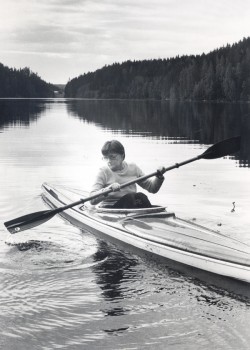
Eeva-Liisa Manner. Photo: Tammi.
Today we have a real treat – a selection of the sumptuously minimalist poetry of Eeva-Liisa Manner (1921–1995) by her near-contemporary, the British poet Herbert Lomas (1924–2011).
Born in Helsinki, Manner spent her youth in Viipuri, in what was then part of Finland; her life was, like Eeva Kilpi’s, marked by evacuation from her home and the subsequent loss of Karelia to the Soviet Union in the Second World War. Her breakthrough collection, Tämä matka (‘This journey’, 1956) marked a major arrival on the modernist poetry scene and her work has been widely translated. Always lyrically minimalist, Manner’s poetry sometimes seemed to approach the limits of language – silence:
The words come and go.
I need words less and less.
Tomorrow maybe
I’ll not need a single one,
she wrote in Niin vaihtuvat vuoden ajat (‘So change the seasons’), as early as 1964.
Lomas brought to the delicate, beautiful textures of Manner’s poetry with its themes of grief, suffering and loneliness a bluff Yorkshire, and entirely masculine, sensibility. For him, Manner had a ‘splendid sanity’ and sense of humour; hers was an oeuvre ‘that heals by listening and recovery’.
Manner’s work has more recently been translated by another English writer, Fleur Jeremiah, in a volume entitled Bright, dusky, bright (Waterloo Press, 2009). A sample of the approach taken by a woman of a different generation can be found here.
*
The digitisation of Books from Finland continues apace, with a total of 360 articles and book extracts made available online so far. Each week, we bring a newly digitised text to your attention.
Funny stuff
1 April 2009 | In the news
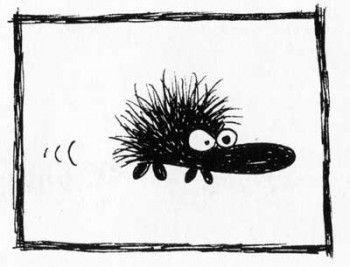
Milla Paloniemi's swearing hedgehog
For the first time, comic books rule the latest bestsellers list of Finnish fiction.
A cartoon series called Fingerpori by Pertti Jarla evidently tickles the Finnish funny bone, as three of his collections occupy the second, sixth and eighth places on the February top ten list, compiled by the Booksellers’ Association of Finland. More…
Stories in the stone
2 December 2010 | Extracts, Non-fiction
Extracts from Jägarens leende. Resor in hällkonstens rymd (‘Smile of the hunter. Travels in the space of rock art’, Söderströms, 2010)
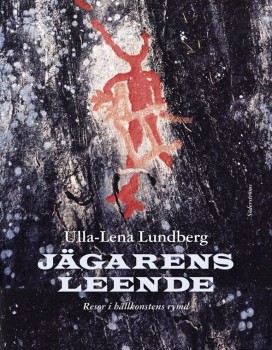 ‘Why do some people choose to expend what is often a great deal of effort hammering images in the bedrock itself, while others conjure up, in the blink of an eye, brilliantly radiant pictures on a rock-face that was empty yesterday but is now peopled by mythological animals, spirits and shamans?
‘Why do some people choose to expend what is often a great deal of effort hammering images in the bedrock itself, while others conjure up, in the blink of an eye, brilliantly radiant pictures on a rock-face that was empty yesterday but is now peopled by mythological animals, spirits and shamans?
‘I think about this often – I who love painting but who still chose a career that involves me sitting and hammering away, day in and day out, like a true rock-carver,’ writes author and ethnologist Ulla-Lena Lundberg in her new book on the art of the primeval man
When the children of Israel went into Babylonian captivity, hanging up their harps on the willow-trees and weeping as they remembered Zion, my sister and I were already sitting by the rivers of Babylon. We knew how they felt. Our father was dead and we had been sent away from our home. We sat there clinging to each other, or rather I was the one clinging to Gunilla, and she had to try to rouse herself and find something for us to do, to give us something else to think about. More…

